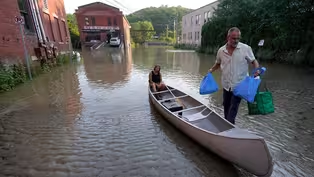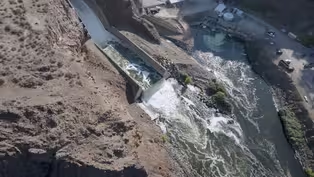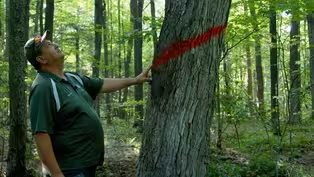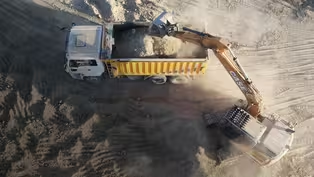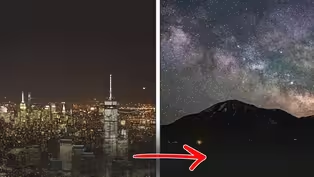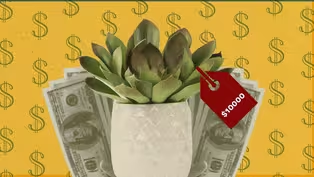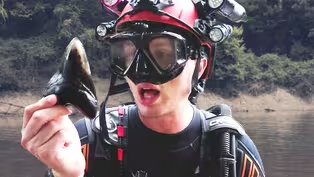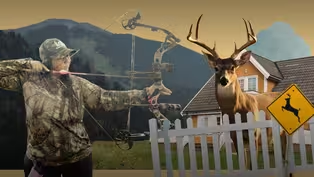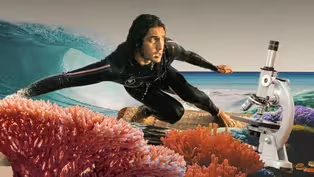
Understory | How Engineered Mosquitos Could Save Birds
Special | 11m 37sVideo has Closed Captions
Discover how bacteria could be the key to stopping mosquito-borne illnesses.
With over a million deaths attributed to them each year, mosquitoes are the deadliest animals on earth. In the hunt to stop the spread of disease, scientists think bacteria could be the key, instead of chemicals.
Problems playing video? | Closed Captioning Feedback
Problems playing video? | Closed Captioning Feedback
Major support is provided by Anne Ray Foundation, a Margaret A. Cargill Philanthropy and the Richard King Mellon Foundation. Support is also provided by John and Ruth Huss, Susan and...

Understory | How Engineered Mosquitos Could Save Birds
Special | 11m 37sVideo has Closed Captions
With over a million deaths attributed to them each year, mosquitoes are the deadliest animals on earth. In the hunt to stop the spread of disease, scientists think bacteria could be the key, instead of chemicals.
Problems playing video? | Closed Captioning Feedback
How to Watch America Outdoors with Baratunde Thurston
America Outdoors with Baratunde Thurston is available to stream on pbs.org and the free PBS App, available on iPhone, Apple TV, Android TV, Android smartphones, Amazon Fire TV, Amazon Fire Tablet, Roku, Samsung Smart TV, and Vizio.
Buy Now
Providing Support for PBS.org
Learn Moreabout PBS online sponsorshipMore from This Collection
How does our country’s diverse landscape shape our experience of the outdoors? That’s the central question behind the new PBS digital series, America Outdoors: Understory. Join host, Baratunde Thurston, as he explores the unexpected places and ways Americans encounter nature, and how their time outside is impacted by climate change, equity, access, outdoor culture and more.
Understory | Climate Change's Effects on Vermont Flooding
Video has Closed Captions
Discover the science behind this summer’s historic and devasting floods in Vermont. (13m)
Understory | Can Dam Demolition Save California's Salmon?
Video has Closed Captions
What happens when you remove dams that changed the Klamath River a hundred years ago? (11m 54s)
Understory | Can Ancient Wisdom Save the Forests?
Video has Closed Captions
Forests are in trouble, but could ancient wisdom be the answer to saving our trees? (11m 54s)
Understory | We’re Running Out of Sand
Video has Closed Captions
Sand may seem unremarkable, but the modern world is built on it and we’re running out. (13m 7s)
Understory | The Movement to Save Our Night Skies
Video has Closed Captions
Explore one small town’s mission to save the night sky and help migrating birds. (12m 59s)
Understory | Rock Climbing's Troubled Route Naming Tradition
Video has Closed Captions
Baratunde meets a rock climber who is working to diversify the sport. (8m 48s)
Understory | How the Houseplant Boom Fueled Plant Poaching
Video has Closed Captions
Baratunde meets a plant parent who is bringing awareness to the issue of plant poaching. (7m 31s)
Understory | The Fossil Hunter Uncovering Florida’s Past
Video has Closed Captions
Baratunde meets a Florida fossil hunter and learns how this hobby contributes to science. (9m 11s)
Understory | Meet the Suburban Deer Hunters of Long Island
Video has Closed Captions
Baratunde meets a female suburban bowhunter to discuss how the sport is changing. (8m 35s)
Understory | The Scientist Surfing to Fight Climate Change
Video has Closed Captions
Baratunde meets a surfer scientist in Hawaii who is trying to protect the corals reefs. (10m 6s)
Providing Support for PBS.org
Learn Moreabout PBS online sponsorship(peaceful music) - Welcome to the beautiful island of Kauai.
White sand beaches, tropical flowers, magnificent birds.
You can't tell me this isn't paradise on Earth.
Just look at it.
(ominous music) But for over a century, this island has been a battleground, a frontline in the war against the deadliest animal in the world.
(mosquitoes buzzing) Mosquitoes.
(dramatic music) - [Narrator] DDT is the most powerful of weapons against the mosquitoes that carry malaria.
- Mosquitoes are killing up to a million people a year.
- It's a battle we've been losing, but the tide, it may be about to turn.
(dramatic music) To understand exactly what's going on, we're joining two scientists who've made it their mission to stop the mosquito from devastating this island ecosystem: Cali Crampton and Cynthia King.
- So down this way maybe.
We're looking for pools of standing water that might have mosquito larvae in them.
- [Baratunde] At an altitude of around 4,000 feet, the Alaka'i Plateau used to be too cold for mosquitoes.
- This species particularly loves to have water with decomposing plant material in it, - [Baratunde] But with temperatures rising thanks to climate change, they're slowly making their way into higher altitudes.
- What's that?
- Oh, no, there's one.
- Yeah, we got some.
- Yes.
- I don't usually have to describe what a mosquito is, because almost everybody knows what a mosquito is.
It's arguably one of the most hated species in the world.
- Now, to be fair to mosquitoes, there are thousands of species, and only a few bite us humans.
But those few can cause a lot of misery, especially when they move to places where they don't normally belong.
- It's really important to remember mosquitoes are not native to Hawaii.
- [Baratunde] That's right, these little blood suckers are invasive species.
And ever since they made themselves at home in the Hawaiian Islands, they've wreaked some serious havoc.
So how did this tiny mosquito journey across vast oceans to get here?
- All right, let's see if this will work.
- [Baratunde] We asked Matthew Kurano, a public health official who knows his mosquitoes.
- [Matthew] Hawaii is very much a paradise, and pre Western contact, there was no mosquitoes, - [Baratunde] But in the 1800s, the whaling industry brought tons of ships to Hawaii.
It just took a few mosquitoes to hitch a ride, and here we are.
- The mosquitoes established pretty rapidly in Hawaii, particularly because we're a very tropical, beautiful, sadly mosquito-friendly area.
Once the populations of mosquitoes established, then all it took was people to bring the disease.
- [Baratunde] As if those mosquitoes weren't enough, people also brought pathogens.
Mosquitoes bit them and then bit other people, a perfect recipe for spreading disease across the islands.
- Mosquitoes are the most deadly animal in the world to humans.
One of the most significant risks they pose is as vectors of human diseases.
- Hawaii has had historic outbreaks.
One of the more notable ones in history occurred right around 1900, and we did have a larger outbreak of dengue.
- Chemical controls are the most common ways that humans typically deal with mosquitoes.
- [Narrator] The answer to the quest for a poison to eradicate the insects was found in DDT.
- [Baratunde] It's hard to imagine now, but there was a time when DDT was considered a miracle pesticide, and it was everywhere.
We considered it a vital weapon in the war against mosquitoes.
- [Narrator] If the worker stands to windward, it is not necessary to wear a mask when dispensing DDT dust.
- Now, I don't know about you, but when there's poison in the air, simply standing upwind isn't gonna cut it for me.
- Several agricultural chemicals, such as DDT, have been banned from general use because of potential hazards to man and animals.
- [Baratunde] At high doses, the pesticide was linked to vomiting, tremors, even seizures.
- [Matthew] My parents always talk about that there'd be DDT trucks leaving a cloud, a fog behind it.
And we don't wanna see children playing in pesticide clouds.
I think we can all agree that that is not in the interest of public health.
- That's all well and good, but without DDT, we've lost our most effective weapon against mosquitoes.
We need something new.
(record scratching) Flash forward to a lab in Lexington, Kentucky.
This is medical entomologist Steven Dobson, who's working on a new approach to mosquito control.
- I like to tell people that we manufacture and sell mosquitoes and just see what their reaction is.
Usually they'll nod, and then you'll see them double take.
- At first, it doesn't seem like much when you see Stephen dropping by people's backyards, tapping on small cardboard tubes, until you realize that what Steven is really doing is releasing thousands of mosquitoes.
(mosquitoes buzzing) Now, I know what you're thinking.
Why would you do that, release more of these things into the wild?
But these are no ordinary mosquitoes.
These insects have been deliberately infected with a naturally occurring bacteria called wolbachia.
(zipper zips) - We are using wolbachia as a way to cause a form of sterility in mosquitoes.
- [Baratunde] Okay, this all sounds a little strange, but bear with me.
Stephen is breeding mosquitoes that carry the wolbachia bacteria.
Then he releases a bunch of them, but only the males.
- We release the males, who are now mating with the females, and effectively sterilizing them.
By continuing to release, the population just goes down with every release until we don't have that species anymore.
- [Baratunde] Got that?
The lab grown-males with the artificially inserted bacteria mate with the wild females that don't have the bacteria, basically interfering with their reproductive process, stopping their eggs from hatching, and the results speak for themselves.
- In the laboratory, we can completely eliminate caged populations.
In the real world, we're still seeing reductions in the population that exceed 95%.
- [Baratunde] Plus, unlike the old DDT days, which wiped out tons of wildlife, this method is highly targeted.
- These males we release, they only mate with one species.
You'll never find a male mosquito trying to mate with a butterfly or a bee.
- Of the 3,000-plus known mosquito species, only 6% bite human, and only 2% are responsible for mosquito-borne illnesses.
The goal is to target only those mosquitoes.
So, in theory, the wolbachia technique leaves the vast majority of mosquitoes alone.
This is a good thing, since mosquitoes can be great sources of food for animals and incredible pollinators.
Of course, this system is in its infancy, and scientists caution that it needs to be rolled out with care.
But if it works, the potential benefits are massive.
So, can wolbachia make a difference in a place like Kauai?
Let's hope so, because mosquitoes, they're not just deadly to humans; they're also decimating some of Earth's rarest birds.
(soft music) - [Cali] There are birds here on Kauai that are found nowhere else in the Hawaii world.
There are six different species.
- [Baratunde] Cali is the project leader of the Kauai Forest Bird Recovery Project.
- These six species are very, very susceptible to the mosquito-borne avian malaria.
They evolved without mosquitoes and they evolved without avian malaria, so they have no resistance to avian malaria, - [Baratunde] And it's not just Kauai.
Native birds on other islands are also endangered by this mosquito invasion.
- One of the species, for example, the 'i'iwi, in cage trials, we have documented that nine of 10 of them will die after being bitten just once by a mosquito carrying avian malaria.
The tremendous amount of harm mosquitoes are doing to those ecosystems by killing off all these birds is staggering.
- [Baratunde] That's why Hawaii is planning to release wolbachia-infected mosquitoes on some of their islands, targeting the specific species of mosquito that transmit malaria in birds and West Nile virus in people.
(dramatic music) - [Cali] Here on Kauai, the plan is to do some of the preliminary research to understand the movement patterns and the survival patterns of males this fall.
- [Baratunde] Large-scale releases are planned for 2024.
Sadly, for some of the birds this will be too late.
- In 2012, we estimated that there were 500 'akikiki left here, which is already a frighteningly low number.
By the end of this year, we expect that they will be extinct in the wild.
- As a mainlander, this is a painful reality just to witness, but for native communities, the loss is almost inconceivable.
(delicate music) - So we're in a traditional house.
We call them hale.
- [Baratunde] Lei Wann is the Director of Limahuli Garden and Preserve in Kauai, in a biodiverse valley that's home to dozens of endangered plants and birds.
- My ancestors come from this valley, and many of them come from this land.
Because our culture, there are really lines between us and birds.
We see them as part of our family.
To think that our children won't have those connections with family members, it's devastating - [Baratunde] To prevent their extinction.
The 'akikiki are being moved to the island of Maui until the Kauai mosquito problem is fixed.
- It was super emotional, because now we have to ask Maui to carry on that responsibility.
We're talking a lot about 'akikiki and 'akeke, but I hear 'i'iwi are next, and the next species is near very threatening levels of extinction.
The time to respond, to act is now.
It was yesterday.
It was a month ago.
- Mosquitoes are so small, we don't notice them until they leave a bite behind, yet the impact they have on the world is hard to ignore.
Without human activity, like globalization and climate change, this little pest wouldn't have such a lasting effect on our lives and environment.
The reality is we are responsible for our complicated relationship with mosquitoes.
It's up to us to call a truce.
- I believe that wolbachia is the best chance that we have to save the remaining species on Kauai.
But beyond that, there's great hopes that this tool will be useful to benefit human health.
- Because sometimes the best way to win isn't to wage an all-out war.
The best way to win is to recruit some lab-grown mosquitoes to our side.
Thanks so much for watching.
For more great tales from the great outdoors, check out season two of "America Outdoors" with Baratunde Thurston.
You can find us in the PBS app or your local PBS station.
Check the link in the description below to watch a full episode and find out more.

- Science and Nature

Explore scientific discoveries on television's most acclaimed science documentary series.

- Science and Nature

Capturing the splendor of the natural world, from the African plains to the Antarctic ice.












Support for PBS provided by:
Major support is provided by Anne Ray Foundation, a Margaret A. Cargill Philanthropy and the Richard King Mellon Foundation. Support is also provided by John and Ruth Huss, Susan and...
